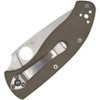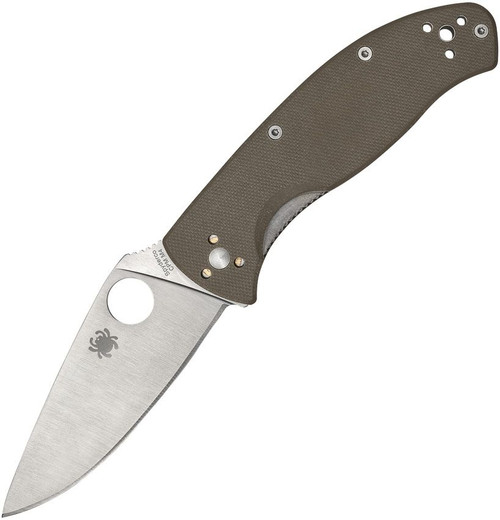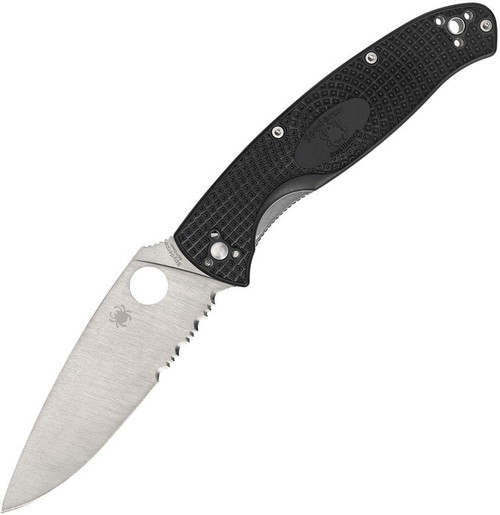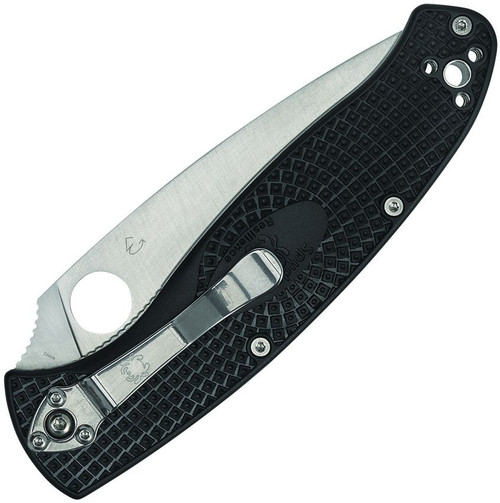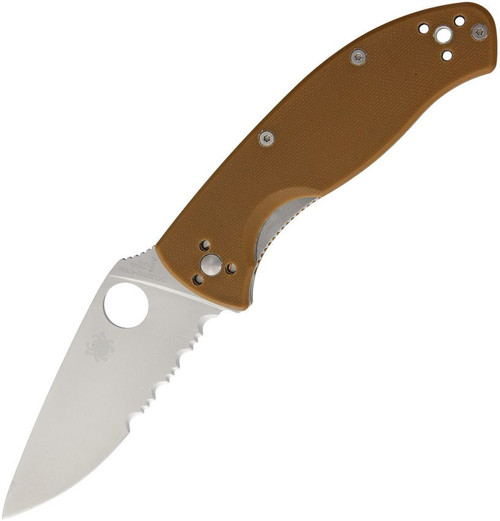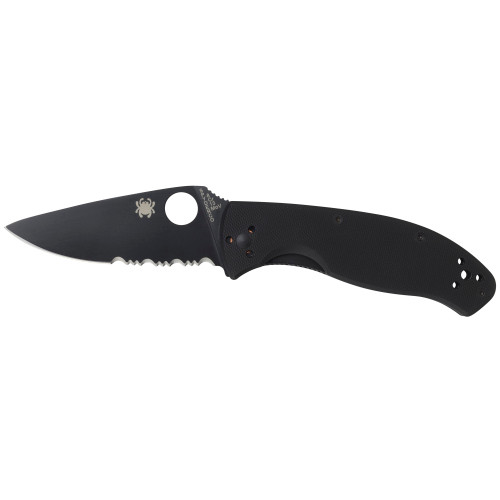*CONTACT US FOR A SPECIAL COUPON CODE!*
Since its introduction in 2008, the Tenacious has earned an enviable place as the flagship of Spyderco's Value Folder family of knives. Purposely designed to provide all the key features of their groundbreaking CLIPIT folding knife platform in a budget-friendly format, Spyderco Value Folders are still some of the best bargains on the knife market.
If you examine the Tenacious closely, you will find its design, engineering, fit, and finish are excellent, easily rivaling Spyderco's other user-oriented knives. It features full, skeletonized stainless steel liners that are a stout 0.062-inches (1.6mm) thick. Separated by stainless steel standoffs to reduce weight and allow easy cleaning, the liners form the foundation of the knife's sturdy LinerLock mechanism that locks the blade securely open during use. They also provide a solid anchor for its broad-based pocket clip, which is fully configurable for left or right-side, tip-up or tip-down carry.
In its original form, the Tenacious features precision-machined peel-ply-textured G10 handle scales. More recently, the Tenacious Lightweight replaced the G10 with tough, injection-molded, fiberglass-reinforced nylon (FRN). The FRN scales added the enhanced grip security of Spyderco's signature Bi-Directional Texture pattern while trimming the knife's weight by almost 10 percent.
On the "business end," standard versions of the Tenacious feature a beautifully full-flat-ground stainless steel blade with a textured thumb ramp and a fully accessible Trademark Round Hole for swift, positive, one-handed opening with either hand. The blade's minimal ricasso also allows the edge to extend all the way to the handle for maximum edge length and extreme control when cutting with the "heel" of the blade.
With all this going for it, you may be wondering how Spyderco is able to make the Tenacious so affordable. The answer to that question is that they made a calculated compromise in their choice of blade steel—8Cr13MoV. By maintaining the highest standards of fit, finish, and handle materials, but using a more economical steel, they created a superior quality working knife that won't break your wallet.
The “Gateway” Knife
For people new to knives and even many seasoned knife users, the standard Tenacious is the perfect cutting tool. Its 8Cr13MoV blade provides a good balance of edge retention, toughness, and corrosion resistance. Although the steel is roughly equivalent to AUS-8, the blade's beautifully executed full-flat grind and long cutting edge give it exceptional edge geometry that allows it to cut well beyond its chemistry. When it does become dull, restoring its edge is a quick and painless process, as 8Cr13MoV is very easy to sharpen. In many ways, this makes the Tenacious the perfect "gateway" knife for novices, those who use their knives for dirty or demanding cutting chores, and those fearful of losing a more expensive knife. With that said, the next logical question is "Gateway to what?"
As knife users gain experience, it's natural for them to wonder about the performance differences of higher-grade steels. For Tenacious fans, the next step up would be the Tenacious Lightweight featuring CPM S35VN stainless steel. Manufactured in America by Crucible Industries, CPM S35VN is a particle metallurgy steel developed to offer improved toughness over CPM S30V. By carefully reducing its vanadium content and adding niobium, CPM S35VN forms some niobium carbides along with vanadium and chromium carbides. Substituting niobium carbides for some of the vanadium carbides makes CPM S35VN about 15-20% tougher than CPM S30V without any loss of wear resistance. This gives it better resistance to edge chipping without compromising its edge-retention properties.
As a blade steel, CPM S35VN is a significant step up from 8Cr13MoV. As an upgrade investment for Tenacious users, it allows them to experience the benefits of a higher quality blade material while maintaining the same design platform as their original knife. For aspiring knife enthusiasts, this process is difficult to beat. That's exactly why we decided to take it a step further by supercharging the Tenacious with an even more elite blade steel—CPM M4.
The Tenacious CPM M4
CPM M4 is a special purpose high speed tool steel produced by the particle metallurgy process. Manufactured in America by Crucible Industries, its sophisticated alloy composition, high vanadium content, and extremely fine grain structure give it exceptional wear resistance and toughness—properties that translate to outstanding edge retention and impact resistance in knife blades. For all these reasons, CPM M4 is a popular material for high-performance custom blades and the specialized knives used in competitive cutting.
Unlike 8Cr13MoV and CPM S35VN, which are both stainless steels, CPM M4 is a tool steel. Its extreme edge retention and toughness come at the price of reduced resistance to corrosion. As such, blades crafted from this steel must be maintained more carefully to protect them from moisture and staining. The benefits of this elite steel, however, far outweigh the minor investment of time needed to care for it.
The Tenacious CPM M4 faithfully maintains all the proven features and benefits of the original model, including full, skeletonized stainless steel liners, a stout LinerLock mechanism, and a versatile four-position pocket clip. To distinguish it from its brethren, its handle scales are precision machined from brown G10 with a peel-ply texture for a non-slip grip. Its defining feature, however, is its blade, which is expertly crafted from CPM M4. The blade's full-flat grind gives it outstanding cross-sectional geometry and an incredibly keen edge. These qualities are further enhanced by its satin finish, which is not only attractive, but reduces friction during use.
The CPM M4 version of the Tenacious elevates this workhorse design to extreme levels of cutting performance and edge retention. In the process, it—together with the other versions of this design—parallels Spyderco's unique Mule Team project, allowing end users to experience and appreciate the performance of different blade steels in the same knife format.
EDGE-U-CATION
Crucible CPM M4
According to Crucible Industries' data sheet, "CPM REX M4 is a special purpose high speed steel designed to give high wear resistance in tools." While that's certainly true, it's a bit of an understatement.
Among tool steels, CPM M4 offers a remarkable combination of malleable strength, high impact toughness, and extreme wear resistance. These qualities enable it to perform exceptionally well in cold-work tooling applications like punches, die and broach inserts, and taps, as well as premium cutting tools for use on abrasive alloys, heat-treated materials, and castings. In these demanding industrial uses, CPM M4 easily outperforms most other high-carbon, high-chromium die steels.
As its name indicates, CPM M4 is produced by the state-of-the-art Crucible Particle Metallurgy (CPM) process. The basic formulation of the steel, however, goes back to 1937 and pioneering metallurgist James P. Gill. The author of one of the first and most definitive books on tool steels, Gill was a lifelong employee of the Vanadium Alloys Steel Company (VASCO) in Latrobe, Pennsylvania. Not surprisingly, he was also a leader in the development of vanadium-enriched steels.
Early efforts to add vanadium to tool steel revealed that once the vanadium content exceeded 2%, the performance of the steel actually declined, as it would draw carbon from the main mass of the steel to form vanadium carbides. Metallurgists later realized that this problem could be solved by increasing the percentage of carbon in the steel. Starting with a baseline carbon content of 0.80%, they found that for every 1% of vanadium added to the steel, the carbon content would have to be increased by 0.16%.
Using this concept, Gill introduced a steel called Neatro in 1937, which contained 1.25% carbon and 4% vanadium, as well as 8% molybdenum. That same year, he filed a patent application on his formulation that was issued as U.S. Patent No. 2,105,114 on January 11, 1938. A year later, that patent was modified to reduce the molybdenum content to 4.5% and add 5.5% tungsten. Neatro was also officially renamed M4.
Despite its impressive performance qualities, as an ingot steel, M4 is difficult to machine in its annealed state and challenging to grind once hardened. However, when M4 is produced by the powder metallurgy process, it allows the addition of 0.06% to 0.08% sulfur. The small sulfides that result are uniformly dispersed throughout the structure of the steel, enhancing its machinability. The particle metallurgy process also promotes a finer, more homogenous carbide structure, making it significantly easier to grind in its hardened state.
Introduced in 1973, CPM M4 was actually recognized by Crucible's metallurgists as one of the steels that most benefited from the particle metallurgy process. According to Dr. Larrin Thomas' excellent book, The Story of Knife Steel, in 1978, Crucible's August Kasak and Edward Dulis wrote:
As a CPM product, M4 has proven to be a pleasant surprise: its toughness, in terms of both impact and bend fracture strengths, is higher than that of any high speed steel grade known to us… The unexpectedly high toughness of CPM M4 is attributable to an optimum combination of relatively high carbide density (number of carbides per unit volume), small size of carbides, and their uniform distribution. This combination of desirable carbide characteristics creates favorable conditions for obtaining a stable, fine-grained microstructure that leads to a high-toughness product without sacrifice of other desirable properties.
For the record, Crucible and Niagara Specialty Metals' data sheets list the specific alloy composition of CPM Rex M4 as follows: Carbon: 1.30%, manganese: 0.30%, silicon: 0.30%, chromium: 4.30%, tungsten: 5.60%, molybdenum: 4.50%, and vanadium: 4.00%. This composition summary does not, however, include trace elements—like the critically important sulfur cited earlier. Adding those, its complete composition also includes 0.03% phosphorous and 0.06% sulfur.
CPM M4 as a Blade Steel
CPM M4's remarkable balance of wear resistance, toughness, and impact strength make it ideally suited to hard-use cutting tools. For that reason, it has long been the blade steel of choice for the elite knives used in cutting competitions—like those organized by BladeSports International, Inc. Their demanding competition courses include everything from cutting delicate paper straws to hacking through 2x4s and thick, free-hanging ropes. These challenges require a knife that is razor sharp and will stay that way despite repeated, full-power chops through seasoned wood and other resilient materials. The fact that CPM M4 is a go-to choice of experienced BladeSports competitors is therefore a true testament to its unique properties as a blade steel.
In the world of production knives, Spyderco was one of the first companies to feature CPM M4 in their blades, largely because of the influence of renowned custom knifemaker and design collaborator Gayle Bradley. In addition to crafting exquisite custom folders and fixed blades, Bradley is also a veteran BladeSports champion, so it's no wonder he had a strong affinity for CPM M4 in his knives. We faithfully followed his lead, using this elite steel in the manufacture of his Bradley Folder, Air, Advocate, and Bradley Folder 2 models.
CPM M4 is an elite, high-performance tool steel with a long and fascinating history. For serious knife users who want to "up their game," the unparalleled combination of edge retention, toughness, and impact resistance it offers in knives is hard to beat. Spyderco is proud to include it in their stable of high-performance blade steels.
Specifications
- Blade Length: 3.35" (85 mm)
- Cutting Edge: 3.35" (85 mm)
- Closed Length: 4.38" (111 mm)
- Overall Length: 7.71" (196 mm)
- Blade Material: CPM-M4 Super Tool Steel
- Blade Thickness: 0.122" (3.1 mm)
- Blade Style: Leaf Shaped
- Blade Grind: Full Flat
- Blade Finish: Satin
- Handle Material: Brown G10
- Liner Material: Stainless Steel
- Locking Mechanism: Liner Lock
- Pocket Clip: Stainless Steel (Tip-Up/Down, Right/Left Carry)
- Weight: 4.2 oz. (119 g)
- Made in China



